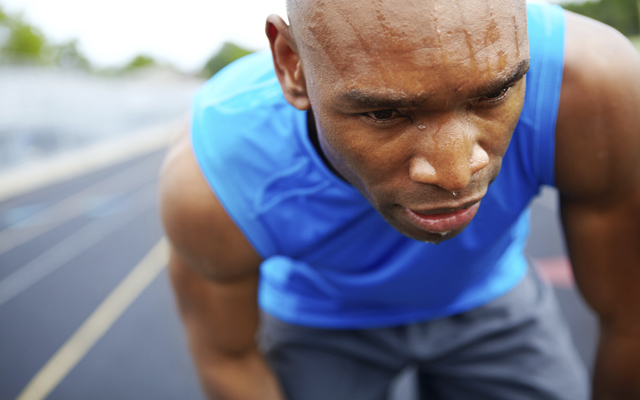Regular gym goers are just as much victims of mental fatigue as elite athletes. With long work days, family obligations, and everyday stress, workouts can suffer resulting in a lack of progress and frustration.
Worse yet, studies suggest that a fatigued brain can decrease performance almost as much as fatigued muscles (1). Described often as “tiredness” or a “lack of energy,” mental fatigue can have a negative impact on cognitive abilities and keep you from performing at your best (3-6).
Because mental fatigue is being increasingly more recognized as a drain to athletic performance, it’s also becoming a hot area of research for exercise physiologists. In a landmark study published in 2009, for example, researchers found that mental fatigue heavily increased perception of effort during physical performance (5).
In the study, subjects either performed a demanding cognitive task or watched television for 90 minutes, followed by cycling to exhaustion at 80 percent of their peak power output. Those who were mentally fatigued from performing the cognitive task had significantly reduced time to exhaustion compared with the control TV watchers.
Interestingly, cardiovascular and muscular responses in both the mental fatigue and control subjects were about the same. However, those mentally fatigued rated perception of effort during exercise to be significantly higher compared with the control.
The authors of the paper argued that mental fatigue was caused more by perception rather than the muscles telling the brain they are tired and out of fuel. The study results suggest that perception itself acts as a regulatory mechanism that can interfere with physical performance, intended to keep a person from hitting their limits.
How To Battle Mental Fatigue
When exercise is perceived as being difficult or painful, it can also be difficult to get the brain and muscles to go through with doing it (6). But there are some mental and nutritional strategies that can be useful for helping to overcome mental fatigue.
In fact, what’s clear from the research on mental fatigue is that most of us can do more than what our brains lead us to believe. Since mental fatigue doesn’t affect important systems like muscles, cardiovascular, and respiration, it’s really all in your head.
If you can find a way to combat mental fatigue, it opens up all new possibilities for training. Here are a few steps shown to be effective in recent studies on improving your mental game:
- Caffeinate. In a recently published study, scientists evaluated the effects of caffeine ingestion on cycling performance in mentally fatigued athletes (7). They found that caffeine ingestion increased endurance by approximately 14 percent after the induction of mental fatigue (7). The additional caffeine was also accompanied by improved mood, or enjoyment of exercise.
- Reward Yourself. Another way to combat mental fatigue is to provide an incentive or reward as a way of motivation. Research suggests that people lose motivation when they don’t predict sufficient reward for their perceived effort (8). A reward could be as simple as enjoying a rest day, a massage, or even a splurging a little with a special meal or treat.
- Say nice things to yourself—when no one else is around. Yes, there is something to motivational self-talk during exercise that can reduce perceived effort and keep you exercising for longer (9). When a personal coach or trainer isn’t available, research suggests that encouragement can come within, leading your brain to change its perception (9). So practice telling yourself, “Five more reps!” or “You can do it—just 15 more minutes!”
- Smile. Something as simple as frowning during exercise can alter your perception of effort and hurt your performance (10-11). While training sensibly with good form is a must, just think to yourself, “Don’t forget to smile.”
Remember, the main takeaway from the research on mental fatigue is that your body is really capable of more than you think. Drink coffee, set up a reward system, encourage yourself, and smile your way to performance success.
References
- Brownsberger J, Edwards A, Crowther R & Cottrell D. Impact of mental fatigue on self-paced exercise. Int J Sports Med. 2013 Dec; 34(12):1029-36.
- Boksem MA, Meijman TF & Lorist MM. Effects of mental fatigue on attention: an ERP study. Brain Res Cogn Brain Res. 2005 Sep; 25(1):107-16.
- Cook DB, O’Connor PJ, Lange G & Steffener J. Functional neuroimaging correlates of mental fatigue induced by cognition among chronic fatigue syndrome patients and controls. Neuroimage. 2007 May 15; 36(1):108-22.
- Ferri P, Guadi M, Marcheselli L, Balduzzi S, Magnani D & Di Lorenzo R. The impact of shift work on the psychological and physical health of nurses in a general hospital: a comparison between rotating night shifts and day shifts. Risk Manag Healthc Policy. 2016 Sep 14; 9:203-211.
- Marcora SM, Staiano W & Manning V. Mental fatigue impairs physical performance in humans. J Appl Physiol. 2009 Mar; 106(3):857-64.
- Sgherza AL, Axen K, Fain R, Hoffman RS, Dunbar CC & Haas F. Effect of naloxone on perceived exertion and exercise capacity during maximal cycle ergometry. J Appl Physiol. 2002 Dec; 93(6):2023-8.
- Azevedo R, Silva-Cavalcante MD, Gualano B, Lima-Silva AE & Bertuzzi R. Effects of caffeine ingestion on endurance performance in mentally fatigued individuals. Eur J Appl Physiol. 2016 Sep 30. [Epub ahead of print]
- Boksem MA & Tops M. Mental fatigue: costs and benefits. Brain Res Rev. 2008 Nov; 59(1):125-39.
- Blanchfield AW, Hardy J, De Morree HM, Staiano W & Marcora SM. Talking yourself out of exhaustion: the effects of self-talk on endurance performance. Med Sci Sports Exerc. 2014; 46(5):998-1007.
- de Morree HM & Marcora SM. Frowning muscle activity and perception of effort during constant-workload cycling. Eur J Appl Physiol. 2012 May; 112(5):1967-72.
- de Morree HM & Marcora SM. The face of effort: frowning muscle activity reflects effort during a physical task. Biol Psychol. 2010 Dec; 85(3):377-82.





